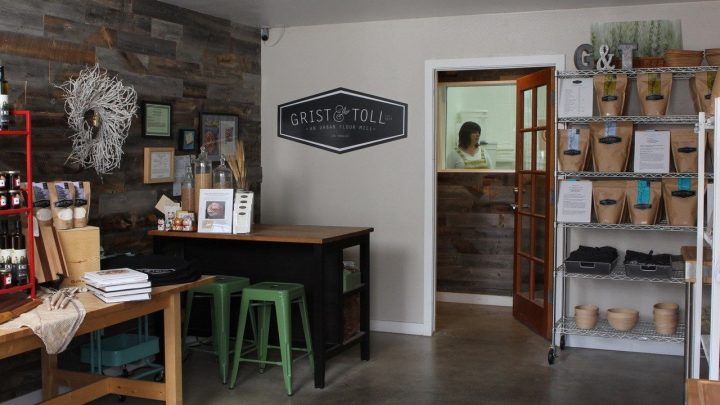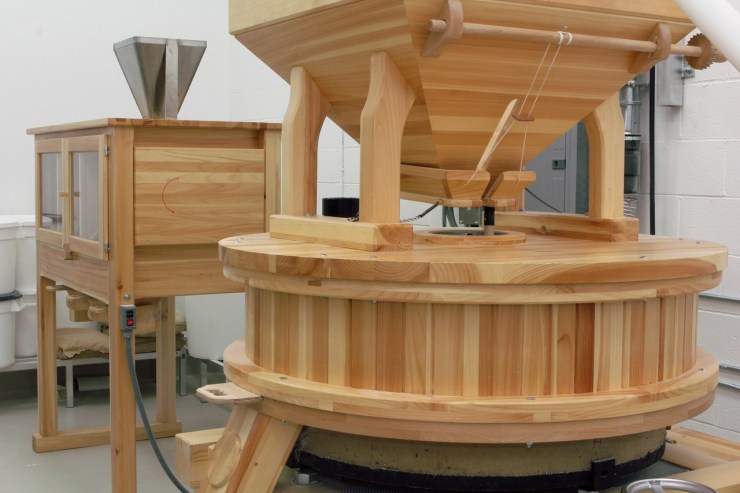
How global economic disruption sifts down to one small flour mill in Pasadena, California
How global economic disruption sifts down to one small flour mill in Pasadena, California

Just off a busy fairway in Pasadena, California, an independent company called Grist & Toll transforms wheat and other grains into freshly milled flour. Nan Kohler, the owner and miller, describes her company as an “urban flour mill,” the first of its kind in the Los Angeles area.
“Marketplace’s” Kai Ryssdal first spoke with Kohler on a visit to Grist & Toll five years ago. Since then, the pandemic, congested supply chains and rising energy costs have stacked challenges against this locally oriented business. With the war in Ukraine shocking grain markets around the world, Ryssdal checked in to see how her business is doing. The following is an edited transcript of their conversation.
Kai Ryssdal: How is — I guess we’re gonna call this the micro-flour business — right now?
Nan Kohler: Well, things have been, I can honestly say, a bit disruptive lately. We’re coming off of two years of COVID, now we’re looking at market disruption due to the war in Ukraine. I’ve definitely had to keep my nose to the grindstone and use all those small business owners’ skills of adaptation and outside-the-box thinking.

Ryssdal: I want to ask you about both parts of that. First of all, the pandemic. You did OK in the pandemic, didn’t you?
Kohler: We did. But you know, it’s not that it was steady. It was kind of a boom with a little bit of a bust, and now we were beginning to even out again.
Ryssdal: OK, so to the present situation. Help me understand how a war in Ukraine and a dilemma that everybody, right, agrees is going to be really bad for global food production and prices because of the centrality of that area of the world in grain — how does that trickle down to Arroyo Parkway in Pasadena?
Kohler: Well, Kai, many of the issues are very parallel to what I experienced during COVID. What disrupts me on a smaller level are the smaller goods costs going up or being unavailable. So certain bag sizes I couldn’t purchase. I had problems with receiving grain — getting my LTL freight deliveries. LTL means “less than truckload,” so I’m moving a few pallets at a time. Now, it’s skyrocketing gas prices. So the cost for smaller movement of goods has radically gone up due to that. I don’t purchase my grain on the commodities market. I pay well above commodity pricing, because I deal directly with smaller-scale farmers, and they are not in that system by and large. So my direct product price, the wheat itself, is not volatile. It’s all of the other components that revolve around that.
Ryssdal: What are your margins like? I mean, do you know what kind of profit you’re making?
Kohler: My margins are healthy, and I’m profitable. Obviously, much more so when I’m selling direct to consumer, my retail sales. It’s funny Kai, when you visited me, you were the first person to ask me out loud, “Nan Kohler, is your business profitable?” No one had ever asked me that point-blank before. My answer was immediately “yes,” which is the truth, but the longer answer is not in the way that I originally imagined when I dreamt up this business. I really thought that I would be primarily driven by bulk flour sales to the wholesale market. Turned out to be not the greatest idea because the costs that go into producing this product are very real, and they’re very, very expensive. So I had actually cut back on the wholesale dramatically just leading into COVID, and I was already poised to be moving into primarily retail business.
Ryssdal: Well timing is everything, but look, let me ask you this: If I swing by on my way home this afternoon to pick up a bag of your most basic flour, how much is it going to cost me? And how do you stay in business when, I imagine, that is several multiples of the $2.50 I pay for a 5-pound bag of flour at Piggly Wiggly.
Kohler: Yeah, you’re gonna pay about $8 to $9, and that would be a 2 1/2-pound bag. I stay in business because people are looking for a healthier product, and it is a radically different product than what we have available to us in the marketplace on the grocery store shelves.
Ryssdal: Now that you’ve made it through the pandemic, and you seem to be tolerating — although, with some caveats there — you seem to be tolerating the inflationary spike and the war, what’s the biggest thing on your mind?
Kohler: The biggest thing on my mind is all of the bigger-picture issues. Our political and financial philosophies that back mass industrialized products are not what’s going to guarantee us food security. We need radical change in policy and financing to support small- to mid-size farms to help build back missing infrastructure.
Ryssdal: Are you hopeful? Lay it on the line. Are you realistic about the chances for any of that happening?
Kohler: I think that I’m not. I’m not seeing decisive, bold leadership from the government. But I’ll just say if I can make a plea to all of the venture capitalists who listen to “Marketplace”: We really need food security to go way up to the top of that list, over tech and over widgets. It’s real, and we keep getting affected by it for different reasons. First COVID, now a war. I’m not optimistic that those types of disruptions will go away anytime soon.
There’s a lot happening in the world. Through it all, Marketplace is here for you.
You rely on Marketplace to break down the world’s events and tell you how it affects you in a fact-based, approachable way. We rely on your financial support to keep making that possible.
Your donation today powers the independent journalism that you rely on. For just $5/month, you can help sustain Marketplace so we can keep reporting on the things that matter to you.
















